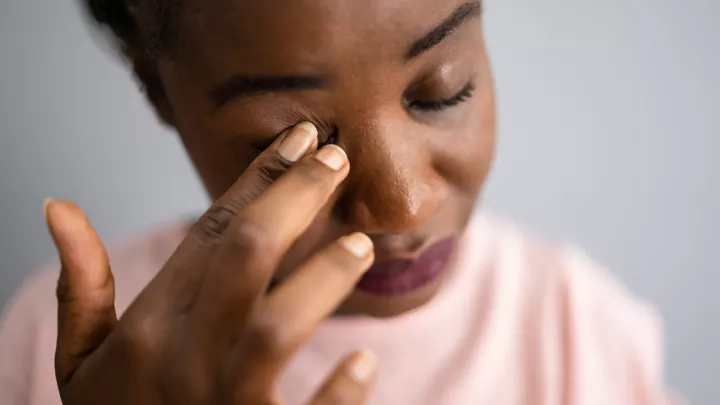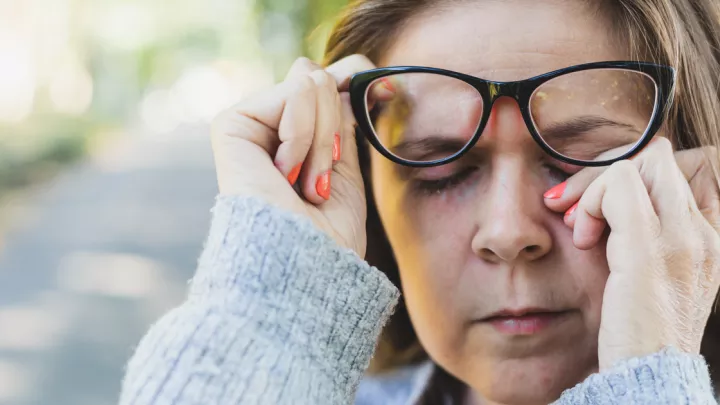How to treat itchy eyes

When it comes to itchy eyes, the first thing that typically comes to mind is allergies. Still, several other factors can also cause itchy eyes. Understanding your symptoms can help you determine the source of your itchy eyes, how to treat them and when to see a doctor.
Common causes of itchy eyes include:
- Allergies
- Eyelash infection called anterior blepharitis
- Viral conjunctivitis (pink eye)
Allergies
Allergies are the most common cause of itchy eyes. If you have allergies, your itchy eyes will typically be accompanied by some or all of these additional symptoms:
- Itchy nose and throat
- Watery eyes
- Runny or stuffy nose
- Sneezing
- Wheezing or coughing
“If you think your itchy eyes may be caused by allergies, taking antihistamine eye drops or pills by mouth will usually clear up the itching and watery eyes,” says Ivey Thornton, MD, Nebraska Medicine ophthalmologist. “The problem with oral and eye drop antihistamines is that they can also cause dryness in your eyes.”
“The best way to treat itchy eyes caused by allergies is to avoid what triggers your allergies. If this is not possible, you can try over-the-counter name-brand allergy eye drops or prescription allergy drops,” says Dr. Thornton. Avoid generic eye drops as they usually have more chemicals and preservatives that can irritate your eyes even more.
Dr. Thornton also recommends trying over-the-counter artificial tears if dry eyes is a concern and refrigerating the artificial tears. “The best choice is a name brand, preservative-free artificial tear that comes in individual vials. The coolness from refrigerating the drops has an antihistamine effect and can help with the itchiness,” she says. “Any type of eye drop that comes in a bottle or you can leave out for more than a day has preservatives.”
Anterior Blepharitis (eyelash infection)
If you are healthy and have no other symptoms, your itchy eyes may be due to an eyelash infection called anterior blepharitis. Blepharitis is caused by an infection, often due to a lack of eyelash cleaning. The infection usually affects both eyes along the edges of the eyelids. The edges of your lids may turn red and become swollen and scaly.
“The condition is more common among men and women who don’t wear makeup as these individuals are less likely to wash their eyes and eyelashes regularly with soap and water,” says Dr. Thornton.
Common symptoms of anterior blepharitis include:
- Mildly swollen eyelids
- Crusting of eyelashes
- Flaking skin around the eyelids
Blepharitis can be diagnosed by your doctor with a clinical evaluation. Treatment includes a prescription antibiotic ointment or over-the-counter blepharitis wipes. “You can also wash your eyelashes nightly with baby shampoo and water as that will be less irritating to the eyes,” says Dr. Thornton. “If you don’t get treatment, the condition will likely linger.”
Viral conjunctivitis
Also known as pink eye, viral conjunctivitis is more common in children. “Patients who have pink eye will usually feel sick like having the flu in addition to having itchy eyes,” says Dr. Thornton.
Common symptoms include:
- Itchy eyes
- Red eyes
- Glassy and watery looking eyes
- Sore throat
- Fever
- Crusting of eyelashes and eyelid corners due to discharge
“Since pink eye is caused by a viral infection, there is no treatment, but you can use over-the-counter preservative-free artificial tears for comfort,” says Dr. Thornton. “Pink eye is highly contagious, so you should stay home and away from others until it has cleared up.”
Pink eye typically clears up in seven to 10 days.
Dr. Thornton recommends practicing good eye hygiene to keep your eyes healthy and vibrant. This includes:
- Washing your eyelids a few times a week before bed.
- Avoid rubbing your eyes. Rubbing the eyes can introduce contaminants that may cause an infection. Excessive eye rubbing can also lead to droopy eyelids and loose skin around the eyes. Over time, it can also weaken the cornea’s structure, leading to vision loss.
- Whenever using eye drops, choose name-brand, preservative-free drops rather than generics.
To schedule an appointment with an eyecare specialist, call 800.922.0000.







